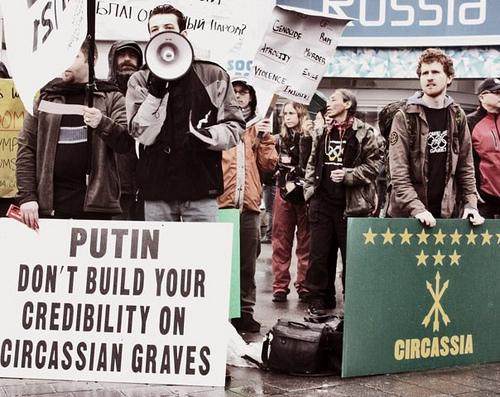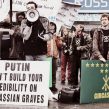
Circassians Step Up Their Activity as Georgian Politicians Consider Olympic Boycott
Publication: Eurasia Daily Monitor Volume: 7 Issue: 212
By:

On November 19-21 in Tbilisi, Georgia, the Jamestown Foundation and Ilia State University held the second conference in the series on the volatile history and present of the North Caucasus. Part of the conference was dedicated to the issue of the Circassian “genocide,” that produced a renewed discussion in Georgia, Russia and beyond about the appropriateness of the 2014 Sochi Winter Olympics.
On November 19, following a meeting of the Georgian parliament’s committees on foreign affairs and compatriots living abroad, the parliament’s press office said that “the legislators considered that it was necessary to convince the international Olympic Committee, National Olympic Committees and the international community in the necessity of holding 2014 Winter Olympiad in a different country.” On November 25, Georgia’s Deputy Prime Minister and State Minister for Euro-Atlantic Integration, Giorgi Baramidze, stated at a press conference in Prague: “I personally express solidarity with the members of parliament, because I understand their sentiments, I understand why they think that Russia does not deserve to be the host of the Olympic Games –because the Olympic movement is something different that Russia demonstrates today” (www.civil.ge, November 26).
Circassian activists argue that the Russian state’s actions in their ancestral homeland in the northwestern Caucasus in the nineteenth and twentieth centuries met the definition of genocide. Therefore, they are demanding that Russia recognize the Circassian “genocide” and cancel the 2014 Sochi Olympics. The location of the Sochi Olympics are on the site where the Russian army inflicted a final defeat on the Circassian forces in 1864, which resulted in the mass deportation of the Circassians from their homeland to the Ottoman Empire.
An estimated 90 percent of the Circassians –6 million-7 million people– currently live outside of their homeland in the North Caucasus, where the remaining Circassians are scattered across four regions: Kabardino-Balkaria, Karachaevo-Cherkessia, Adygea and the Krasnodar region. The Circassians are a clear majority of the population only in Kabardino-Balkaria. Since the murder of civilians, mass deportations and other violent acts were vividly described by Russian army officers and generals themselves, and the modern Russian state assumes it is legally derived from the historical Russian empire, the Circassian activists say, contemporary Russia should also bear responsibility for its past actions (www.kavkaz-uzel.ru, November 23).
The Georgian side has its own score to settle with Russia. Following the Russian-Georgian war in 2008, Russia recognized the Georgian breakaway region of Abkhazia as an independent state, to the detriment of Tbilisi, and Abkhazia borders the Russian region of Sochi. On November 25, the parliament of Georgia set up a temporary commission on issues related to the Sochi Olympics. According to official Georgian statements, the aim of the commission is not to prevent the Olympics from taking place, but rather to urge Russia to comply with the rules of the Olympic Charter (www.kavkaz-uzel.ru, November 25).
Russian media tried to diminish the significance of the conference in Tbilisi. The newspaper Nezavisimaya Gazeta reported (in a short article on page 6) that the conference was less representative than the first one, which took place in March 2010, and that this time, only one Circassian from the North Caucasus attended the event (www.ng.ru, November 23). In fact, representatives from more countries were present at the second conference, than the first. Furthermore, the conference attracted renowned participants such as Lord Frank Judd, French philosopher Andre Glucksmann, political scientist Raj Menon and a number of other prominent experts and specialist took part in the latest symposium as well, including Chechen human rights activist Lidia Yusupova who came from Chechnya to participate in the conference using the new visa free travel regime.
The conference undoubtedly had reverberations in the North Caucasus. As Murat Gukemukhov, a Circassian analyst with Radio Free Europe/Radio Liberty’s Ekho Kavkaza, put it, he had never encountered a Circassian in the North Caucasus who had even a slightest doubt over the “genocide” the Circassians were subjected to during the Russian-Caucasian war of the nineteenth century. The only difference between Circassians of various walks of life is how to treat this fact and how to overcome it. According to Gukemukhov, the majority of the Circassians in the North Caucasus welcome the attention the issue of the Circassian “genocide” is given as well as being against the Winter Olympics in Sochi (www.ekhokavkaza.com, November 21).
Meanwhile, the situation in the North West Caucasus is increasingly showing signs of deepening destabilization. According to an official statement by the Russian interior ministry’s subdivision in the North Caucasus, Kabardino-Balkaria and Dagestan emerged as the two most volatile territories in the region in 2010. The number of attacks in Kabardino-Balkaria increased from 21 in 2009 to 117 for the first 10 months of 2010 (www.ng.ru, November 24). On November 22, a bomb detonated on the railway connecting Sochi and Matsesta in what the authorities officially recognized as a terrorist attack. In an interview with Ekho Kavkaza, Dagestani expert Suleiman Suleimanov dismissed the idea that by creating the North Caucasus Federal District and separating it from the Southern Federal District, where Sochi is located, Moscow could insulate the future Olympic sites from the mounting instability in the North Caucasus. “Sochi is still closer to Makhachkala and Nalchik than to Moscow or St. Petersburg, so it is no wonder that the Black Sea coast might share the fate of all of the [North] Caucasus,” Suleimanov said (www.ekhokavkaza.com, November 22).
The 2014 Sochi Olympics and the question surrounding the Circassian “genocide” are likely to become one of the dominant issues pertaining to the situation in the North Caucasus in the next several years. These topics encapsulate the lack of recognition of Russia’s past offenses in the North Caucasus and their continual recreation in the present. Thus, the issue of the Circassian “genocide” has inherently far greater significance than the Circassian people, touching upon the foundations of Moscow’ policies toward the North Caucasus and the Russian state in general.




